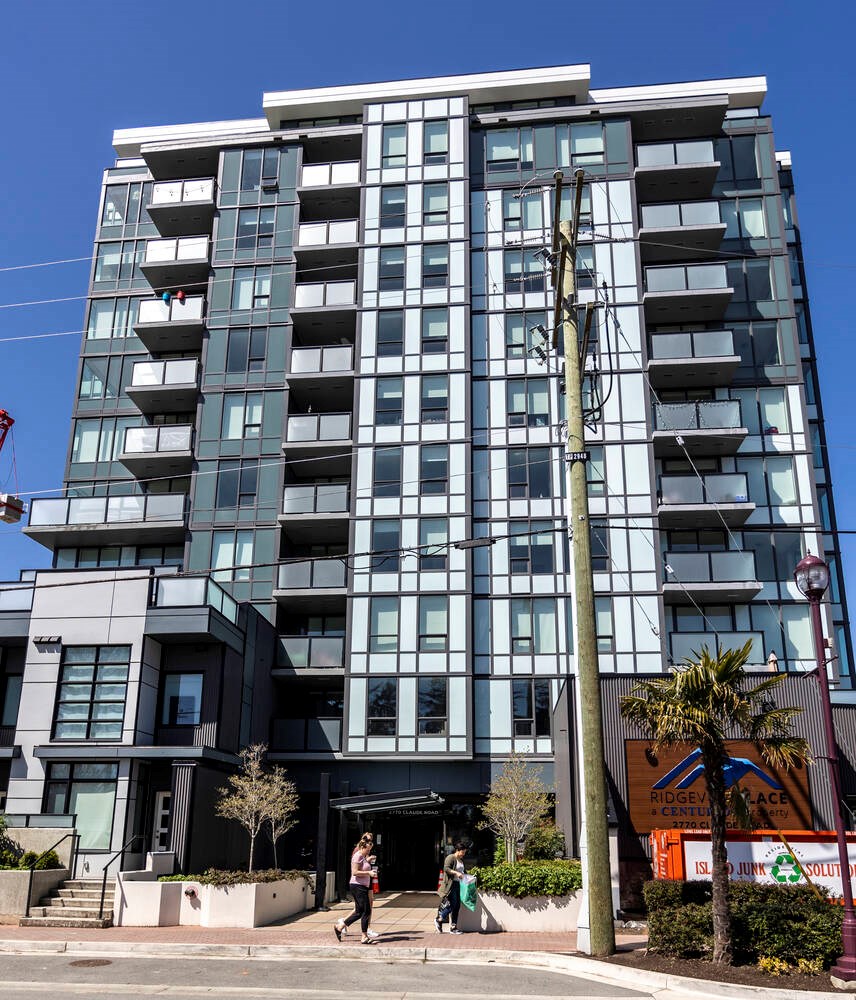A recent B.C. Supreme Court ruling involving the Langford apartment building where tenants were twice forced to evacuate due to safety concerns highlights the importance of negotiating contracts, says a University of British Columbia assistant law professor.
Justice Gordon Weatherill dismissed negligence claims against engineering firm Sorensen Trilogy Engineering Ltd. and its engineers, which were involved in the design of RidgeView Place.
The 11-storey apartment building in Langford, formerly known as Danbrook One, was evacuated in December 2019 and again on April 24 of this year because of safety concerns.
Weatherill decided that the engineering firm and engineers did not owe a duty of care to the owner, because the nature of the relationship was determined by contractual agreements.
“They considered and allocated the very risk at issue in this proceeding through the contractual terms,” Weatherill wrote.
The buyer placed responsibility for the building’s proper design entirely on the builder, DB Services, requiring that DB Services obtain professional liability insurance, Weatherill wrote. DB Services did not obtain the insurance it was required to obtain under the contract, the ruling says.
The decision is being appealed. The proceedings are continuing with a court date set for next February, as other claims have yet to be decided.
Negligence is a legal cause of action that says “you harmed me in circumstances where you owed a duty to take care of me, so you should have been looking out for my interests,” said Samuel Beswick, an assistant professor in the University of British Columbia’s school of law.
“What the court is saying is, well, you just got a bad bargain, but the tort of negligence is about injury, redressing wrongful injuries to people. Ordinarily, just because you entered into a bad bargain doesn’t mean that you’ve been injured.”
The point of contracting is to allocate risk, he said, and whether a deal is good or bad for a company depends on the price paid and whether it was worth it at the time of negotiating to allocate risk in the way the company chose to.
“We do that all the time in contracting. So, often, we’ll forego the extended warranty on the products that we’re buying, because we’ll take the risk that the product won’t break. But we could negotiate for that five-year warranty, but then we’re going to be paying a bit more for it,” Beswick said.
In his decision in December, Weatherill determined that the liability of the engineering firm involved was limited to the fees paid to the firm for its work on the building, because of a liability clause included in a contract between the firm and the design-builder.
The building owner, Centurion Apartment Properties Limited Partnership, is suing the seller, builder, engineering firm and engineers involved and the City of Langford.
The company is seeking recovery for economic loss, alleging negligence in the design and construction of the building, as well as breach of contract, misrepresentation, and failure to warn.
Two engineers at Sorensen Trilogy Engineering lost their registrations with the provincial regulatory body, Engineers and Geoscientists of B.C., after investigations into their work on the building. Brian McClure, the structural engineer of record for the design and construction, and Ted Sorensen admitted to demonstrating unprofessional conduct.
An independent review conducted in July 2019 by structural engineering firm Stantec indicated the building’s core walls may have been “deficient under seismic load and that the structural detailing for some of the major seismic resisting elements may not be in compliance with the British Columbia Building Code.”
Following remediation work, Langford reissued an occupancy permit in April 2022 and the building was reoccupied. On April 24, Centurion notified residents the company was ending tenancies immediately following an inspection of the building by an engineer who concluded it was unsafe and recommended evacuation until a more detailed analysis could be done.
The inspection followed notice by the Engineers and Geoscientists of B.C. of an investigation into the engineer responsible for remediation work.
>>> To comment on this article, write a letter to the editor: [email protected]




